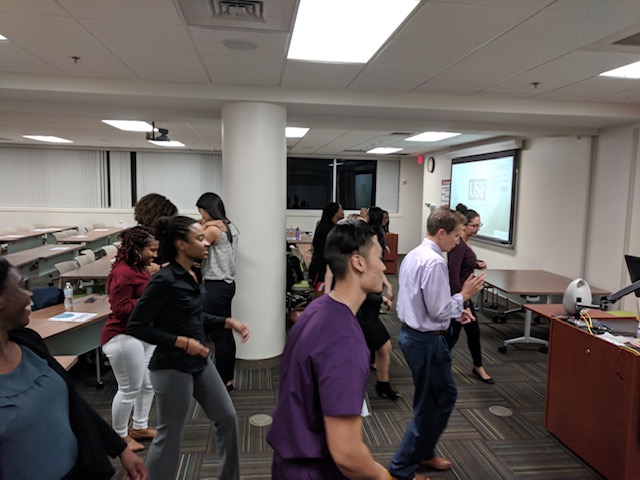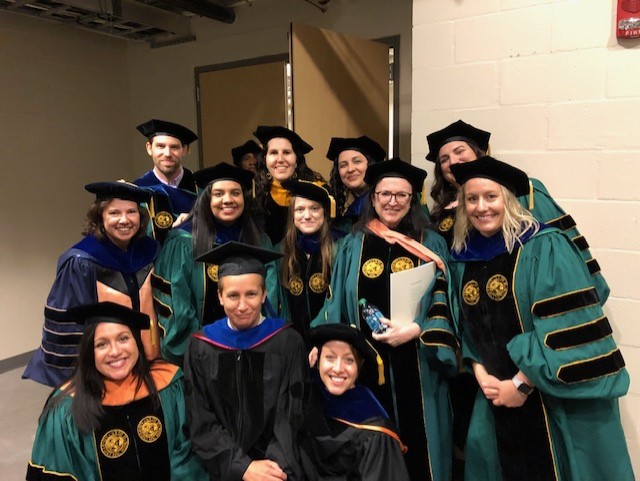Dr. Joe Bohn honored with 2021 COPH Excellence in Teaching Award
Since 2008, students in the USF College of Public Health (COPH) have annually recognized outstanding instruction at the Annual National Public Health Awards Ceremony. On April 7, graduate and undergraduate students joined forces to present the Excellence in Teaching Award to Dr. Joe Bohn, assistant professor, director of community engagement and deputy director of the DrPH program.

“Dr. Bohn is one of the most thoughtful and engaging instructors and advisors I have had. He is extremely knowledgeable, but also has such a passion for learning more about all topics, especially public health,” said an anonymous student nominator. “He is so busy but will find time to speak with students on weekends, evenings, etc. He inspires me to help others and I also hope that I show as much passion in my work as he does in his.”

Bohn joined the COPH in 2016 with a diversified background in public health education, behavioral health advocacy, healthcare and logistics. This created a practice and academic background that enabled him to coordinate and lead interdisciplinary teams and projects while teaching, supporting academic administration and filling community engagement leadership roles.
Over the past five years, Bohn has taught doctoral level teaching systems, social and complexity science topics in the DrPH practice program, community health intervention planning, implementation and evaluation at the master’s level and critical social issues at the undergraduate level.
“As a professor, one of my goals is to go beyond teaching content and to build practical and philosophical knowledge with the students, based on their level of education, so they are better equipped to address issues in their careers and lives,” Bohn said. “I aim to help students build critical thinking skills and problem-solving skills to change how they see, reflect and process some of the controversial health topics in society today. I strive to be a positive influence and inspire them to be change agents as their careers move forward.”

Bohn’s teaching methods reflect his view that students are motivated to learn and gain knowledge to apply in their careers, research and life interests. He believes that teaching at undergraduate, master’s and doctorate levels requires attention to the students’ needs and introducing topics as building blocks for strengthening competencies, opening conceptual and theoretical windows for knowledge generation and strengthening qualitative research skills.
“Dr. Bohn provided extremely comprehensive feedback to all of the students in the course. It was unbelievable how much time he spent assessing each assignment. He inspired students to learn the material and go beyond what was presented,” said an anonymous student nominator. “His passion for the material came through to the students. It was a challenging course, but I learned so much. He also treats students with respect and views them more as peers than students.”

His classes engage other faculty and feature guest speakers with subject matter expertise that deepens students’ perspective. Teamwork and team building are emphasized at all levels.
“I encourage students to participate and engage in every class, virtually and or in-person, to ask and help answer questions with classmates and encourage trans-disciplinary teaming and learning,” Bohn said. “Experiential learning has been a priority at the undergraduate level to shape those experiences and help students see how they connect to what is discussed in the classroom.”

Serving as director of community engagement, Bohn has created a portfolio of community activities and initiatives to integrate in classroom pedagogical lesson plans, presentations and class discussion on the importance of community service with case examples from field work.
“Recognizing the #1 health priority of our students in 2018, 19 and 20 was mental health (e.g., stress, anxiety and depression), my community efforts focused on behavioral health provided excellent reference examples that connected with the students’ needs,” he said.
Story by Caitlin Keough, USF College of Public Health
